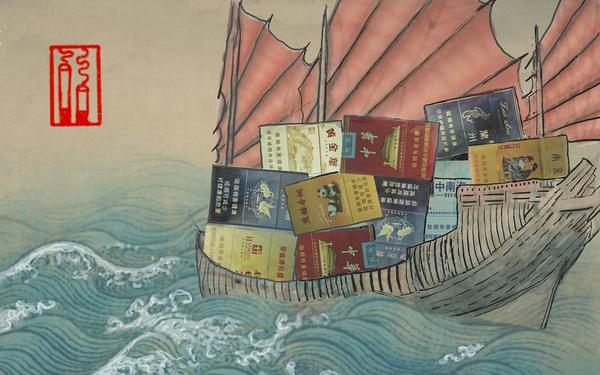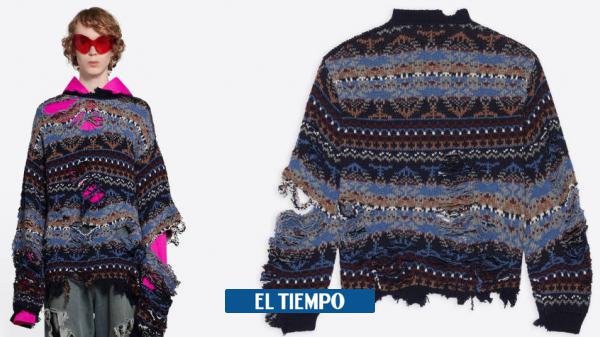Special Investigation | The flood of Chinese cigarettes in Latin America passes through Panama
By Nathan Jaccard (OCCRP), Sol Lauría (Concolón), David Tarazona (Public Issue), Mateo Yepes (Public Issue), Lilia Saúl (OCCRP)
The Colon Free Zone bills itself as “a quintessential trade showcase,” offering exporters a myriad of duty-free products arriving from all over the world to this bustling city at the mouth of the Panama Canal.
It is also “the Disneyland of contraband,” according to Daniel Rico, a Colombian expert on criminal economies. "Whisky, cigarettes, medicines...everything."
Now, journalists have uncovered a network of shell companies based in Panama that ship huge quantities of Chinese cigarettes from the free zone to Latin American countries where there is no legal market for such products. The companies have ties to China's huge state-owned tobacco company and have sold to people accused of smuggling.
The China National Tobacco Corporation (CNTC) is the world's largest cigarette company. It controls nearly half the world market and sells most of its cigarettes to China's nearly 300 million smokers. But the huge conglomerate, known as China Tobacco, is trying to expand its reach even further, building new markets from Africa to Europe.
Smuggling is an important part of that strategy, experts say, and Panama has become a key platform in China Tobacco's campaign in Latin America
Journalists from OCCRP and its partners, Cuestión Pública of Colombia and Revista Concolón of Panama, discovered that CNTC cigarettes have flooded countries from Mexico to Ecuador. The text on the packs is in Spanish, which suggests that they are made specifically for Latin American markets, although Chile appears to be the only country where it is legal to sell them.
With this strategy, the CNTC follows the example of the big tobacco companies, which are the group of companies that have dominated world trade for years: British American Tobacco (BAT), Imperial Brands, Japan Tobacco International and Philip Morris International ( PMI), owner of Marlboro.
In the 1990s, Rico recalled, Marlboro packs began to enter Colombia, with aggressive price competition to break local brands. At that time, PMI negotiated with Colombia's Directorate of National Taxes and Customs (DIAN).
“One day they went and told Dian that they wanted to legalize, but they already had control of the entire market,” explained Rico, who is director of the research firm C-Análisis. "Smuggling is a way to expand the market."
About this research
Lax regulations
Once again, a wave of illegal cigarettes floods Colombia. But they're not Marlboro anymore, the packs now carry names like Golden Deer and Silver Elephant, along with other CNTC brands.
In July 2020, authorities intercepted a huge shipment of Chinese cigarettes, confiscating nearly enough for each of Colombia's 50 million people to smoke two packs.
A database obtained by reporters reviews the cigarette seizures and does not mention the companies involved, so it is impossible to know if they are part of the network connected to the CNTC. However, they were able to trace the path of the CNTC's 96 million packs of Marshal, Golden and Brass cigarettes to the hands of smugglers in Colombia.
The cigarettes were manufactured in China and shipped to Colón. They then traversed the Caribbean, with stops in Jamaica and Aruba – a tactic to hide their origin – before finally arriving in the Colombian coastal city of Cartagena and being transported to a free zone in the capital, Bogotá, a senior customs official explained. Colombian. He requested anonymity because he is not authorized to speak to journalists.
While it was the largest seizure of Chinese cigarettes in Colombian history – or any type of cigarette, for that matter – it was just one of many. Cuestión Pública had access to a database of cigarette seizures compiled by the Colombian Fiscal and Customs Police (Polfa), where it can be seen that six of the 10 most confiscated brands in the country between 2015 and August 2020 were produced by Chinese Tobacco.
And smuggling seems to be growing rapidly. Colombian authorities seized 300,000 packs of Chinese cigarettes in 2016. But in the first seven months of 2020 alone, more than 6 million packs were seized.
Credit: Colombian National Police
In other Latin American countries the pattern is similar.
In Brazil, seizures of Chinese cigarettes increased nearly 165 percent last year, according to data obtained by OCCRP through a public information request. 201,386 packs were seized in 2020, compared to 76,122 the previous year. In 2015, the authorities only seized 2,007 packs.
Of the 7.2 billion illegal cigarettes consumed in Mexico between February 2019 and 2020, about 38 percent were Chinese, according to Oxford Economics, a global research firm. Mexican authorities seized more than 25 million packs of contraband cigarettes in a single raid last September, including Chinese brands, according to media reports. In November, a gasoline truck owned by the Mexican state oil company, PEMEX, was stopped on a bridge connecting the state of Texas with the Mexican city of Reynosa. He had 8,500 CNTC Marble brand packets hidden in the cabin.
And according to a study published this year by researchers from the Pontificia Universidad Católica del Ecuador, close to a quarter of the illicit cigarettes consumed in Ecuador are Chinese.

“About the illicit sale of Chinese cigarettes in the region, we have no relevant knowledge,” declared the Chinese embassy in Ecuador, which received a large shipment of cigarettes from one of the Panamanian companies in the network discovered by journalists.
In Venezuela, the consumption of illegal cigarettes has grown by 300 percent since 2019, according to a study by Cigarrera Bigott, a subsidiary of BAT. Illicit cigarettes comprise 30 percent of the entire market, costing the government $130 million in unpaid taxes annually. A CNTC brand, Golden Deer, represents 8 percent of the illegal market.
Credit: DIAN
Experts say that Panama – where last year authorities seized 28 containers of illegal cigarettes before they were shipped – is the most important regional center for this illicit trade.
“The great distribution point for Chinese, Uruguayan and Paraguayan cigarettes is Panama,” Rico said, mentioning two South American countries that are also known for the production of illicit cigarettes. "All this reaches the Colon Free Zone and from there it is distributed throughout Latin America."
Lax regulations and lax enforcement mean that companies can abuse the zone's regulations without receiving any punishment, explains María Lorena Cummings of the Colón Chamber of Commerce.
Any company in the area can buy Chinese cigarettes duty free and can game the system to pay almost no duty when exporting them. It is easy to make a false export declaration, especially since very few containers leaving the port are checked.
And even if a company is found out, Cummings explains, the penalties are ridiculously low compared to the potential profits from a shipment of smuggled cigarettes.
“It's such a profitable business, so profitable, that you can take the risk,” he said. "If you don't have the technical staff, if you don't have the technology... and exemplary fines, you have a breeding ground" for illegal activity, counterfeiting, smuggling and money laundering.
Credit: DIAN
Corporate smokescreen
For many people, cigarette smuggling can conjure up images of rusty ships pulling into clandestine ports to drop off their illicit cargo in isolated coastal locations. And actually, that still happens.
Last year, Colombian authorities detained a ramshackle ship off its Caribbean coast that was carrying more than 1.7 million packs of Chinese cigarettes. The ship had left Panama, but it did not have any documentation on board showing that the cigarettes could legally enter Colombia.
But the operation uncovered by reporters involving companies linked to CNTC in Panama is much more sophisticated.
Shipments are mired in a great deal of paperwork and commercial red tape, giving companies the ability to deny their connection to smuggling. However, evidence collected by journalists shows that companies ship large quantities of cigarettes to countries where there is no legal market for these products. And the companies have done business with smugglers operating in those countries.
Reporters uncovered four companies operating in Panama that have ties to the CNTC, though the significant volume of Chinese cigarettes being smuggled into Latin America suggests more such networks are yet to be uncovered. The four companies registered in Panama were contacted, but none responded to the questionnaires sent.
Photo: Overseas United Inc of Panama
Overseas United Inc.
Overseas United, a partnership between a CNTC subsidiary – China Tobacco Hunan Co. – and a Singaporean firm, began producing cigarettes in a factory in Panama in 2012. Three years later, the factory received an official visit of Wang Weihua, at that time the main Chinese diplomat in Panama and director of the commercial office in the country.
Weihua praised Hunan China Tobacco Co., one of CNTC's largest subsidiaries, for the start-up of the factory. He added that it was a sample of China's strategy of "going out" to the world, a State doctrine that laid the foundations of the "Belt and Road Initiative" (BRI) of the Asian giant to develop trade and infrastructure globally.
“I hope the factory will continue to expand its production scale in the future and expand to Central and South America with Panama as a base,” Weihua said in an article posted on the website of the Chinese Ministry of Commerce.
He further noted that the company had shipped cigarettes to “Mexico, Costa Rica, Nicaragua, Colombia, Chile, Peru and other countries in Central and South America,” although Chile appears to be the only country in Latin America where there is a legal market for CNTC products.
But Overseas United was exposed after China Tobacco brands appeared for sale on the streets of Panama. A year after Weihua's visit to the factory, the authorities canceled the company's export permits. Overseas United has failed to convince Panama's Supreme Court to reverse the decision, but that hasn't stopped two company executives from continuing to ship Chinese cigarettes to other countries. You are just using another company to do it.
Feint Inc.
Overseas United President Chew Seng Kiang and its director Chew Teck Chuang are also directors of Finta Inc. With offices in the Colon Free Zone, Finta exported more than 632 tons of cigarettes to Belize, Canada and United States between May 2013 and October 2018, according to business records.
Finta's main customer was the Victor M. Guerra Inc Duty Free Shop, a US company whose owner was convicted in May 2020 of trying to smuggle cigarettes into Mexico. He was arrested earlier that year after police stopped a truck with 17 million cigarettes leaving one of his warehouses for Mexico.
He had a fake bill of lading written in English, which showed the alleged cargo to be used clothing, toys and handbags. The driver was carrying another document in Spanish that stated the truck was carrying cotton, according to local news outlet MyRGV. Subsequently, more than 422 million cigarettes were seized at two company warehouses, including "numerous cigarette brands prohibited in Mexico," according to court documents.
Import data shows that Victor M. Guerra Inc imported into the United States CNTC brands such as Win, Golden Deer and Nise, which Mexican authorities have seized in anti-smuggling operations over the years.
Finta sold more than 599 tons of cigarettes to this company, which were sent from Colón to Houston in 44 shipments. Victor M. Guerra also received shipments directly from Overseas United, as well as from another company that is connected to Finta: Take Roll.
Kinea Internacional SA, and Take Roll Company Ltd, S.A.
Business registry documents show that two of Finta's “legal representatives” were also executives at Kinea and Take Roll. One is Valeska Johanna Aedo Ayala, a Chilean national. The other is Leung Kam Fat, from Hong Kong and with a British passport. Leung and Aedo also appear in the Panama Papers, a set of documents leaked to the International Consortium of Investigative Journalists (ICIJ) from the Mossack Fonseca law firm, which created shell companies for clients around the world. One of the companies that Mossack Fonseca registered in the British Virgin Islands shares the same name as the Panamanian firm, Take Roll.
Leung is listed as president and director of Take Roll in Panama, where Aedo is director and secretary. Leung is also a director and sole shareholder of the sister company in the British Virgin Islands.
Leaked emails show that British Virgin Islands company Take Roll was set up to facilitate the tobacco trade. In communications from March 2014, a Mossack Fonseca lawyer provided some background on the new company.
“Our client is engaged in the purchase and resale of Tobacco (cigarettes) and liquor through other legal entities that we have set up for him as well,” the lawyer wrote. "These goods are supplied by companies located mainly in China and are sold to customers located mainly in Latin American countries such as Peru and Belize."
There is no legal market for CNTC cigarettes in Peru, while Belize is a known smuggling hub. Documents from the Belize Intellectual Property Office show that Kinea and Take Roll have registered seven CNTC trademarks in that country, including Silver Elephant and Far Star.
The email listed Kinea Internacional as one of Take Roll's clients, and its fiscal address was in the Colon Free Zone. The lawyer also named three of the mainland Chinese companies that make up the CNTC as suppliers: Hongta Tobacco (Group) Co Ltd, China Tobacco Hunan Industrial Co Ltd, Hongyunhonghe Tobacco (Group) Co Ltd.
Credit: Lilia Saúl
Meanwhile, export records show Panama-registered Kinea and Take Roll shipped Chinese cigarettes from the Colon Free Zone to several Latin American countries, including Peru and Colombia. Kinea sent shipments to Bolivia, as well as to a client based in Ciudad del Este, Paraguay's second-largest city and a known smuggling hotspot in the so-called Triple Border, a region it shares with Argentina and Brazil.
In 2010, Kinea sent nearly $34,500 worth of cigarettes, as well as liquor, to the Chinese Embassy in Quito, Ecuador. One wonders why the Chinese diplomatic mission would need such a quantity of tobacco.
“The Chinese Embassy's purchase of liquor and cigarettes constitutes diplomatic material and is for the exclusive use of the Embassy,” the embassy told OCCRP.
But the shipment appeared to be too large for the sole consumption of Chinese diplomats, according to a tobacco control expert in Ecuador.
“That answer really surprises me because $30,000 is a lot, especially for diplomatic issues,” said Tatiana Villacrés, author of several reports on illicit tobacco in Ecuador. "Seems like an irrational response in my opinion."
But it was in Colombia where the authorities revealed the links of the two companies with smuggling. Between 2012 and 2018, Kinea and Take Roll exported more than US$40 million worth of Chinese cigarettes to Colombia. Almost all of them were destined for companies based in Maicao, a city on the northeastern border with Venezuela that is known for smuggling.
Kinea's main client was José Guillermo Maestre Díaz, a popular vallenato composer from the Caribbean coast of Colombia. But in 2015 the show ended for Maestre, when he was arrested along with 14 other people accused of being part of a smuggling network. The Ministry of Finance affirmed that the group moved 70 percent of the illegal merchandise in Colombia, according to the newspaper El Tiempo.
Credit: Lilia Saúl
Lost battle
One advantage that the CNTC seems to have over its competitors is the ability to rely on China's diplomatic weight, which has only increased with Belt and Road investments in Latin America.
Juan Carlos Buitrago said that when he was director of the Colombian Tax and Customs Police between 2018 and 2020, the tobacco companies asked him to work with the Chinese authorities to stop the flow of illegal CNTC cigarettes in the country.
“It has been impossible,” said Buitrago, who now heads the consulting firm Strategos BIP.
He affirmed that the Colombian government yielded to pressure from China not to include strong measures against the smuggling of all types of merchandise in a bilateral trade agreement. At one point, the Chinese ambassador even asked him to stop an operation against a network that smuggled shoes, cigarettes and other merchandise, in which Chinese citizens were involved.
“The possibility of at least trying to have cooperation with the Chinese authorities was frustrating because that market is practically part of their economic and state policy,” added Buitrago.
Despite Colombia's efforts to fight the illegal trade in Chinese cigarettes, it's easy to find them in Bogotá, even in stores that have already been seized.
Credit: David Tarrazona
A merchant in San Andresitos, a downtown neighborhood known for selling black market goods, was offering boxes of 2,000 cigarettes for less than $300. The cigarettes were stored in a nearby warehouse, he said. Three other merchants also offered Chinese cigarettes to a journalist.
On an adjacent street, a man sold him Marshal Mint cigarettes – produced by CNTC's China Tobacco Hunan Industrial – that he had in his backpack, for which he asked $5.50 for a carton of 10 packs. Another man said that he could get him a carton for only $4.70, or 47 cents a pack. By comparison, a pack of Marlboro or Lucky Strike costs almost $2.50 on the legal market.
Some 3,000 kilometers to the north, in the Tepito market in Mexico City, a carton with 10 packs of contraband Chinese cigarettes sells for US$6. In the legal market, a carton of popular brands like Camel o Chesterfield is about US$33.
If China Tobacco has its way, those cigarettes will soon be able to be legally marketed in Mexico. At least five of the Chinese companies that make up the CNTC have applied to the government for permission to sell their products in the country.
The strategy follows the pattern of other Big Tobacco companies: allow their brands to flood illicit markets, then push to legalize them. This is what PMI did a few decades ago with Marlboro in Colombia, according to two experts and a customs official who requested anonymity because he was not authorized to speak to journalists.
“If you want to understand what is happening now, look at what happened in the 1980s and 1990s with the big tobacco producers,” the official concluded.
Additional reporting by Alessia Cerantola (OCCRP), Luiz Toledo (OCCRP), St. John “Sinjin” Barned-Smith (Houston Chronicle). Daniel Salazar (OCCRP ID), Dragana Peco (OCCRP ID) contributed to the investigation.


























Winter Prep List: How to Get Ready for Winter
06/06/2022Are you prepared for winter? It's not too late to get ready, but you'll want to take care of some important tasks in order to make sure you're prepared for the cold weather. This winter pr...